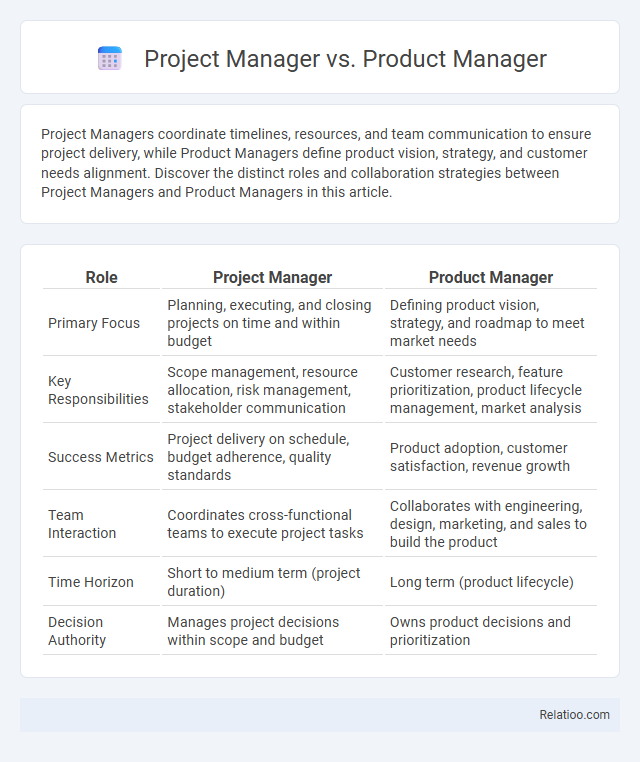Project Managers coordinate timelines, resources, and team communication to ensure project delivery, while Product Managers define product vision, strategy, and customer needs alignment. Discover the distinct roles and collaboration strategies between Project Managers and Product Managers in this article.
Table of Comparison
| Role | Project Manager | Product Manager |
|---|---|---|
| Primary Focus | Planning, executing, and closing projects on time and within budget | Defining product vision, strategy, and roadmap to meet market needs |
| Key Responsibilities | Scope management, resource allocation, risk management, stakeholder communication | Customer research, feature prioritization, product lifecycle management, market analysis |
| Success Metrics | Project delivery on schedule, budget adherence, quality standards | Product adoption, customer satisfaction, revenue growth |
| Team Interaction | Coordinates cross-functional teams to execute project tasks | Collaborates with engineering, design, marketing, and sales to build the product |
| Time Horizon | Short to medium term (project duration) | Long term (product lifecycle) |
| Decision Authority | Manages project decisions within scope and budget | Owns product decisions and prioritization |
Introduction: Project Manager vs Product Manager
Project Managers focus on planning, executing, and closing projects while ensuring timelines, budgets, and resources are managed efficiently to meet specific goals. Product Managers drive the vision, strategy, and roadmap of a product, prioritizing features and customer needs to maximize business value. The primary distinction lies in Project Managers managing temporary initiatives with defined scopes, whereas Product Managers oversee ongoing product development and lifecycle management.
Defining the Project Manager Role
The Project Manager defines, plans, and oversees project execution to ensure timely delivery within scope and budget, focusing on resource allocation, risk management, and stakeholder communication. Unlike the Product Manager, who drives the product vision, market strategy, and user experience, the Project Manager's primary duty is to coordinate tasks and manage constraints across teams to achieve project objectives. This role demands strong organizational skills and an ability to translate project goals into actionable steps while balancing competing priorities.
Understanding the Product Manager Role
The Product Manager drives the vision, strategy, and roadmap of a product, coordinating cross-functional teams to deliver solutions that meet customer needs and business goals. Unlike Project Managers, who focus on executing specific initiatives within defined scopes, timelines, and budgets, Product Managers prioritize product lifecycle management, market research, and user experience innovation. Understanding the Product Manager role means recognizing its critical responsibility in aligning product development with market demands and fostering long-term growth.
Key Responsibilities Compared
Project Managers oversee timelines, budgets, and resource allocation to ensure successful project delivery, focusing on execution and process management. Product Managers define the product vision, prioritize features, and align development with customer needs and market demands, emphasizing strategy and user experience. Your role shifts significantly between managing project completion and driving long-term product success, highlighting distinct but complementary responsibilities.
Core Skills and Competencies
Project Managers excel in planning, risk management, and resource allocation to ensure timely delivery of specific projects within scope and budget. Product Managers focus on market research, user experience, and strategic vision to develop and improve products that meet customer needs and business goals. Your success depends on understanding these roles' core competencies: project management demands organizational and leadership skills, while product management requires strong analytical thinking and customer-centric decision-making.
Overlapping Duties and Differences
Project Managers and Product Managers both drive successful outcomes but focus on distinct areas; Project Managers oversee timelines, budgets, and resource allocation to complete specific projects, while Product Managers concentrate on product vision, market needs, and customer satisfaction. Overlapping duties include stakeholder communication, cross-functional collaboration, and risk management, ensuring alignment between project execution and product goals. Your understanding of these roles helps optimize team efficiency by clarifying responsibilities and fostering effective coordination.
Workflow and Processes
Project Managers oversee workflows by defining task sequences, setting deadlines, and managing resources to ensure project completion within scope and time constraints. Product Managers drive product development processes by identifying market needs, prioritizing features, and collaborating cross-functionally to align product outcomes with business goals. Duty allocation varies as Project Managers focus on execution and risk mitigation, while Product Managers emphasize strategy, customer feedback integration, and product lifecycle management.
Career Paths and Progression
Project Managers oversee specific initiatives, ensuring timely delivery within scope and budget, making their career progression lean towards Program or Portfolio Management roles. Product Managers focus on the entire product lifecycle, driving strategy and market fit, which can lead to advancement into Chief Product Officer or Head of Product positions. Your career path choice depends on whether you prefer managing operational execution or shaping product vision and strategy.
How to Choose: Which Role Fits You?
Choosing between a Project Manager and a Product Manager depends on your strengths and career goals. Project Managers excel in planning, resource allocation, and deadline management, ensuring project completion within scope and budget. Product Managers focus on market research, product vision, and user experience, driving product development aligned with customer needs and business objectives.
Conclusion: Making the Right Choice
Selecting between a Project Manager, Product Manager, and Duty depends on organizational goals and role specifics; Project Managers excel in timeline and resource management, while Product Managers focus on vision, strategy, and customer needs. Understanding these distinct responsibilities ensures effective team collaboration and project success. Aligning roles with business objectives optimizes performance and drives sustainable growth.

Infographic: Project Manager vs Product Manager
 relatioo.com
relatioo.com